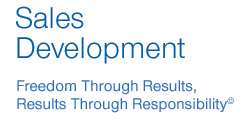12 Essential Ingredients to Building an Over-achieving Sales Culture - Vol. 3
November 25th, 2009If you’ve worked through the heavy lifting involved in the eight steps I described in Volumes One and Two, Congratulations. You are well on your way to consistent over-achievement and significant revenue growth. The Final Four are quite easy and straight-forward. Three of these steps can be easily determined via an objective assessment. The final step involves simple a simple commitment.
9. Skills – All selling skills are a blessing. The more, the merrier. But certain skill sets are essential for overachieving. Your Sales Team must be able to hunt for new opportunities, identify the most qualified and be able to close them. Seek and develop Hunters, Qualifiers and Closers. Consider everything else a bonus.
10. Urgency - An over-achieving salesperson must have a killer instinct. They must have the sense to understand when their prospects are trying to deflect or wiggle away and the skills to deal with these put-offs. The Law of Diminishing Pain is profound and abundant. If a prospect doesn’t agree to do business with you while you’re speaking with him, while you have the ability to influence him, while you have his attention and while his issue is biggest and brightest, the chances that he will decide to do business with you when he returns from vacation or his “two crazy weeks of busy-ness” are highly unlikely. He’ll have 89 pressing issues to deal with upon his return and the problem you are now talking about will seem less pressing. If you allow for put-offs, understand the consequences of your bailing out. If you are LUCKY, you’ll extend your sales cycle by weeks or months. More likely, the order will simply not happen.
11. Weaknesses - Unfortunately, there are dozens weaknesses that will neutralize all of the factors listed above. The five most debilitating weaknesses are Need for Approval, Non-Supportive Buy Cycle, Emotional Involvement, The Money Weakness, and Self-Limiting Psychological Records (aka: Head Trash). Fortunately, these can all be measured and systematically eliminated once identified.
12. Coaching and Training - Your coaching must support any training initiative and help salespeople overcome their weaknesses, develop skills and master the selling process. Make it clear that your salespeople understand that their recurrent coaching/de-briefing appointment is the single most important meeting on their calendar. Each over-achieving salesperson must be prepared for their weekly de-brief. Attendance must be non-negotiable.
There are your 12 steps. If you follow this simple formula, the results will exceed your wildest expectations. Start now and watch what happens in 2010!
Joe
Copyright © Joe Zente 2009. All Rights Reserved.
Bookmark the CEO Success Blog!









